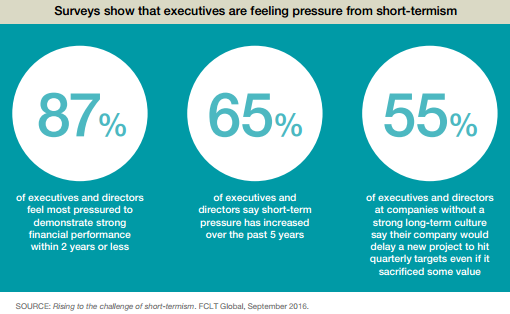A Short-Term View is Hurting Your Business, and There's Growing Proof
Having a long-term view can have a remarkable impact on an organization.

On a Friday afternoon it can be hard to muster enough motivation to think ahead to your Monday to-dos, even though that’s a strategy some experts believe can help boost productivity.
But let’s be honest: is looking three days ahead really going to help you accomplish much in the long-run? Personal productivity hacks aside, it turns out having a long-term view can have a remarkable impact on an organization.
According to a recent study by McKinsey, which looked at a data set of 615 large- and mid-cap U.S. publicly listed companies from 2001-2015, the revenue of long-term firms cumulatively grew on average 47 percent more than the revenue of other firms, and with less volatility.
It turns out VMware channel chief Ross Brown is on to something with his three-year-outlook that gets him teased at work.
“I’m teased internally that I’m always looking ahead three years out in a company that looks at things 90 days out,” Brown said in an interview with MSPmentor. “But that’s the role of a good channel chief.”
Looking at the data, McKinsey found that long-term firms invested more than other firms in the same period; long-term companies on average spent almost 50 percent more in this area during the financial crisis compared to the short-term peers who cut R&D expenditure.
Long-term companies also exhibit stronger financial performance over time, and added on average 12,000 more jobs than short-term companies during the period.
McKinsey says these findings come as CEOs face increasing pressure for short-term results.

“Recent surveys of C-suite executives that we have conducted suggest that pressure to deliver strong short-term results has increased in the past five years and, as a result, many executives believe their companies are using excessively short time horizons in their strategic planning,” McKinsey said in its report. “However, evidence that short-termism genuinely detracts from corporate performance and economic growth has remained scarce, partly because of difficulties in measuring the phenomenon, which does not correspond to any single quantifiable metric and is a confluence of many complex factors.”
McKinsey plans to research short-termism further to investigate industry and sector differences, geographic drivers, and if short-termism is linked to declining productivity growth.
Perhaps it’s time to flip a bit further ahead in your calendar and plan a long-term approach that will bring your organization real results.
Read more about the impact of favoring short-term results over long-term strategy here: Do Salespeople Make the Worst Tech CEOs?
About the Author
You May Also Like


